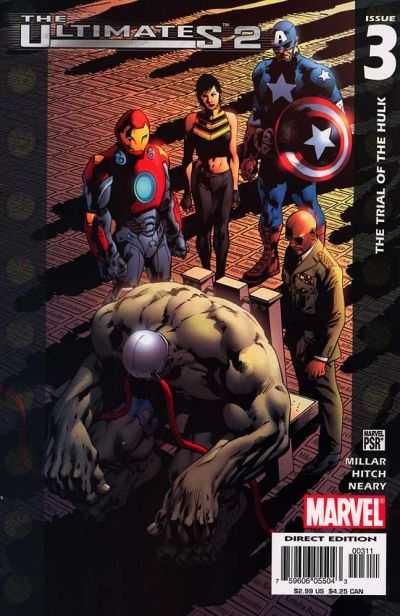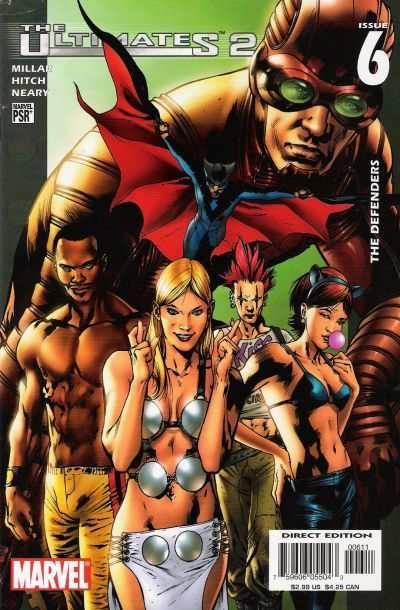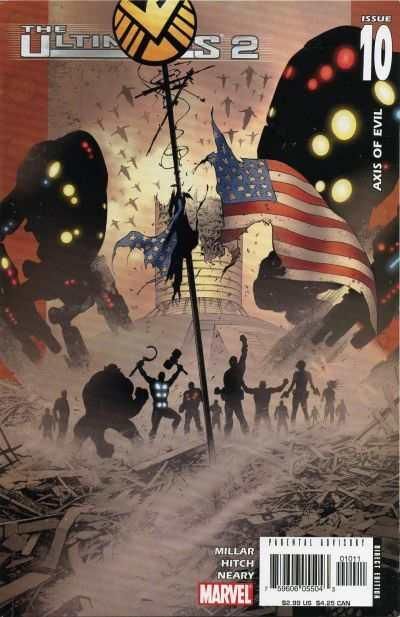Last week, I dropped the ball in a couple of areas, but I plan to make up for that this week. Maybe. We'll see. Spoilers below -- like who the traitor to the Ultimates was. Non-spoiler answer: a huge disappointment. Fun.
The Ultimates 2 by Mark Millar and Bryan Hitch is, in many ways, superior to the first volume; by the same token, in many ways, it's worse. So, let's compare and determine how and why this volume is better and worse than the previous!
Bryan Hitch's Art
I didn't discuss Hitch last week. At all. Some people noticed. What? I'm a writer, took English in university, and focus on writing. I know, this is comics, which means discussing the art, too. I've been trying to get better at that, but you can see how that's been going when I write about a comic where the art is one of the things people know it for... and I don't discuss the art. Ooops! I'll rectify that now...
Bryan Hitch's art in both volumes is worse than his work on The Authority, which was the best work of his career. And just like that, 99% of you disagree with me, right? Let me explain: in The Ultimates (both volumes), Hitch continually moves in a direction of photoreference, posing, odd 'camera angles' and an obsession with packing every panel with so much detail that they become sterile. In the commentary of The Ultimates 2, Millar praises Hitch for the amount of research and dedication he puts into every single panels, so it's so absolutely packed with detail that no other artist could hope to match it -- why would one want to? In some cases, Hitch adds little details that make a scene better (the Captain America costume on Pym's bed), but a lot of the time, his pages are too busy and disrupt the flow of the narrative. And I am a staunch believer that the primary goal of the artist is to tell the story in the best fashion possible... I'm not convinced Hitch does.
If you go back to his twelve Authority issues, the pages are just as lush, just as energetic, and quite detailed... but lack the overuse of photoreferences, crammed panels, and weird choices for the POV in a panel. In seems that with The Ultimates, Hitch became too obsessed with recreating the real world and the art suffers on the whole. I won't deny that individual pages or panels may be the best-drawn work he's ever done, but it's not the best comic book art he's done. It's a weird difference that may only be making sense to me. I like artists who embrace the subject matter and photorealism has little place in superhero comics as far as I'm concerned... I am horribly distracted by that sort of thing -- Sam Jackson as Nick Fury is a great idea, but drawing an entire comic that way is distracting and kind of ruins the fictional aspect of it, and not in a metafictional way that works with the story being told but in a way that takes you right out of what you're reading because a well-known actor is drawn into the story alongside fictional characters for no reason other than it would be cool to have said actor cast as that fictional character. I really have no stomach for it.
Page after page of the art has characters looking right at the reader. Why? Maybe I was wrong, maybe Hitch is going for some metafictional commentary, because why else would ever shot of a character have them looking right at us? That full-on, stare-at-the-reader shot can be a powerful tool... but Hitch does it all of the time and when that shot is used continually with photorealistic art, it's distracting and disconcerting. It doesn't make those panels better or add to the story in any way that I can tell. When people talk about the artist being the director, cinematographer, director of photography, etc... they're not exactly bullshitting you, because Hitch demonstrates clearly here that an artist is those things and he's not that great at those jobs. Oh, he nails the action stuff. He absolutely nails the action stuff, but the quiet moments, the serious moments? Very hit-and-miss. The Ultimates 2 really is a big summer blockbuster because the action sequences are amazing and the direction is awful any time things aren't exploding. Go back to The Authority and note the differences.
The Politics of The Ultimates 2
I didn't delve into the post-9/11 element of The Ultimates a whole lot last week, but this volume amps up those elements to a greater degree. But, Millar doesn't say anything new or meaningful. The superheroes are used as weapons in global politics, what with them being in the military, and that comes back to bite them and the US on the ass. The sophistication of discourse doesn't really rise beyond that. And that's fine, but that's why I didn't really discuss the political implications of the group and story last week... it just doesn't warrant it except for a brief mention. There are no real discussions here (about anything, actually... but more on that in a moment) about the role of superhumans in the 21st century, just a few talking points and lots of exploding. Which is fine, but let's not kid ourselves here, okay?
The Structure, Story, and the Mystery Story
One thing this volume does much better than the previous one is tell a cohesive story from beginning to end. While the first go-'round felt a little slapped together as Millar and Hitch figured out what they wanted to do and how they wanted to tell the story, this one is much better. The pacing is stronger, the story itself is more engaging, the character moments are there but the plot also moves forward... You get the sense here of one story being told right from the beginning, a sense you didn't get last time when the alien threat was introduced halfway through (save a quick line right at the beginning). Here, it's all there in the first issue.
The story itself is rather good: Loki works against the group to get at Thor while a member of the group betrays the team to a competing international group that's upset with the United States and its use of superhumans. The two plots merge and that's all you need to know. It's very simple, it is a plot that works only for this group of characters, and it's involved enough to justify the size of the story. How it unfolds is good. The threat of the Ultimates being used internationally is introduced, mentioned numerous times and then executed. The groundwork for a traitor inside the group is set up before being shown directly. I have few complaints about the actual story of this volume and think it's strong from beginning to end.
I do think the mystery of the team's traitor is executed in an awful fashion that post-2000 comics seem incapable of avoiding, because everyone is so worried that someone online will figure it out first. So, there are red herrings, there are flat-out lies, there are trick angles, there is a reliance on magic, and there is a complete lack of sense when the identity of the traitor is revealed. If I was in a more energetic mood, I would do a full analysis of this mystery using Raymond Chandler's "Twelve Notes of the Mystery Story," as I'm wont to do from time to time. I will say that the mystery fails on pretty much every level. Go back and read Hank Pym's conversation with the traitor and it makes no sense. The hand shown resembles a man's hand/arm than a woman's... plus, Pym says "...I just wouldn't have had you pegged as a traitor," while the traitor responds that America isn't a nation that (s)he believes in anymore.
Does that make any sense with the revelation that the traitor is the Black Widow? As she points out after she reveals herself to Stark, she's a Russian spy... duh. How can we reconcile that discussion the traitor has with Pym and the identity of the traitor? Simple, we can't. It doesn't make sense and, on that level, the traitor plot fails completely. Up until the revelation that Natasha betrayed them, it works... but sometimes a mystery is only as good as its solution...
Captain America as the traitor didn't really work either -- unless it wasn't the real Captain America as they suspect when he's revealed as the traitor initially. I liked that touch, because it was a tease to everyone who dislike this Cap because he's an asshole that maybe this isn't really Captain America. Cruel. I like it. But, that didn't make sense for the Pym conversation either since there's no way that conversation would be so calm.
The only other candidates that have logic on their side are Fury and Stark. Fury is in charge of the group, so why would he betray them? The traitor should have been Stark. That would have made sense given his politics, his knowledge of technology, and his idealism. But you can't really have Ultimate Iron Man turn on the Ultimate Avengers when regular Iron Man was set to do the same thing to the regular Avengers in Civil War, right? Still, Stark is the only candidate that actually makes sense given the clues planted.
Oh, and if anyone says that the clues don't matter because of Loki's ability to alter reality, ignore them -- or, at least, don't let them anywhere near a keyboard, because they clearly have no idea how to write a good mystery story.
The Characters
Millar does a good job of building on these characters, carrying over subplots from the previous volume. My favourite issue is the Hank Pym issue for various reasons, but mostly because he really delves into that character and shows us a lot about who he is and what motivates him. He just wants to be a hero (or known AS a hero), but will settle for what he can get. Like I said before, Hitch adding the Captain America costume on his bed in the background after his 19-year-old girlfriend asked him to dress up as Cap is fabulous. For all those that wanted to see Pym get put through hell after hitting the Wasp, this issue does it.
Stark doesn't get much on-screen time, I find. His relationship with Natasha is superficially handled, just hitting enough scenes so we're aware what's happening, I think.
Captain America reveals himself as a fantastic character in this volume as Millar really amps up his feeling out of touch with the world. His brain just can't catch up with all that's changed -- an incredibly difficult thing to do. His world is quite different from ours and Millar never forgets that, thankfully. The scene where he goes after Thor is very well done, I think -- if only because when Thor clearly demonstrates that he's not Cap's enemy, Cap sticks to his guns, not sure how else to react. He's embarrassed and resorts of a childish retort of, basically, "Yeah, well, I still hate you, doody-head!"
I'm not a big fan of how Thor is handled in this story since I think Millar overdoes it on the Jesus imagery and language. Thor stopping the kids at the club from their assault on Cap was a nice touch, though. Other than that, I'm not a fan.
I'm just kind of floundering here, does it show? None of the other characters jump out at me. I still like Hawkeye, Banner is pretty good, but everyone else... they really don't stand out now that I'm looking back. Not even Jan. I don't know.
The topics of how likable these characters are came up in the comments section last week and I've been considering it... and these characters still aren't likable -- except for Hank Pym and Bruce Banner, oddly... two characters we shouldn't like. But, I don't think that hurts the story -- I continue to believe that unlikable, self-involved people who rise above their natures and fight to help others is more interesting than good, likable people doing good deeds... there's no struggle or conflict there. Here, there's nothing but struggle and conflict as every character tries to balance their personal and professional lives.
Minor Random Notes
* The fight between the Hulk and Abomination is an utter disaster... we see the Abomination beating up the Hulk in a fairly dominant manner and then... it's reversed? Always bugs me.
* The end, where the team makes the decision to become a traditional superhero team is interesting, giving the two stories a different overall arc than one would see the first time they read them.
* There's a little bit of horror film logic for Fury: the hand he uses to hold Betty's hand is the same one he loses (well, he loses the whole arm) later...
* Loki here is a boring, flat character.
* Did Quicksilver and the Scarlet Witch act like this in Ultimate X-Men?
* The Scarlet Witch hitting on Pym's Vision robot is so fucking forced.
* The Liberators were a good note-for-note foil for the Ultimates.
* The constant "Steve Rogers looks just like Brad Pitt" comments are annoying.
* Despite what this post may make you think, I did enjoy this book... it's just easier to focus on the negatives than the positives.
Next week, another Ultimate book. My favourite Ultimate book, actually.




